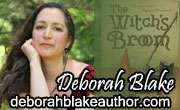
In various books and internet resources dealing with elemental magic, paths and witchcraft, there are often chapters devoted to “The Water Witch”, “The Fire Witch”, and so on. There are also usually sections intended to help you “discover your element” or “what kind of elemental witch are you?”
In the explorations of “Eclectic Elementals”, I will be expounding on similar concepts but in the terms of the elemental “Path”, not just “Witch”. While magical practice is frequently a key aspect of many Pagan spiritualities, particularly as regards the Elements - the cornerstone of almost all magical workings - I have found that not all who practice magic always identify as “witches”.
















